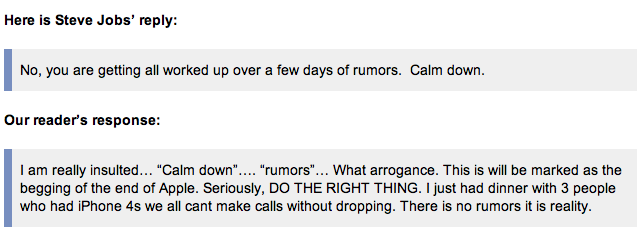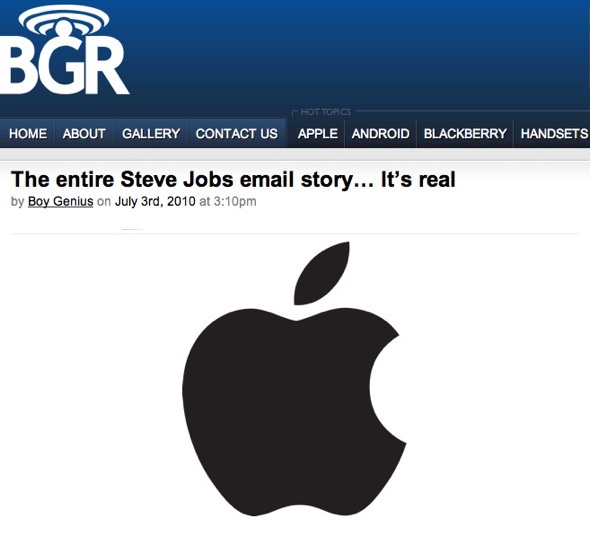
Before you read this post I need to ask you to participate in an experiment with me. Seriously, thus isn’t a joke. The gist of this post will make more sense it you play along. Bookmark this post, do the experiment and then, when you have finished the task, come back and read on.
Here is the experiment.
1. Next time your significant other, child or parent is really upset about something say the following to them… “Stop getting so worked up. Calm Down and Relax.”
2. Make a mental note of their response and how effective your “calming” words were.
3. Come back and read the rest of the post.
Task done? Good. So how did it go? Did telling them to calm down sooth the situation? Did they “relax”?
No? Of course not.

From the BoyGeniusReport
In fact I’m sure it was just as effective with them as it was when Steve Jobs apparently replied to an iPhone 4 user’s complaints about the device’s reception issue,
…you are getting all worked up over a few days of rumors. Calm down.
Now the entire episode is the stuff of TV drama’s… or perhaps a bad sitcom.
First there was the purported email exchange. (It can be read in its entirety here.)
Then Fortune magazine reported that when
Asked on the record whether Steve Jobs was the author of any of these statements, a top Apple spokesperson emphatically denied it.

Then The Boy Genius Report shot back stating that the entire episode is true and the emails did indeed come from Jobs.
Were the emails actually from Jobs? Did Apple’s PR Department out-and-out lie? What’s really going on here? All we know at this point is that this is only going to get more interesting.
There is, however, something to be learned from this already and that is this… email is a terrific means of communication. It is convenient, it is fast and, thanks to devices like the iPhone and the Blackberry, it is with us all the time.
But email is also dangerous. The convenience of email and its ubiquity makes it far too easy to respond to people without fully thinking things through. It lets us shoot off emails that, while not meant to be terse, come off as snotty as… well as snotty as telling someone who is upset to “Calm down.”
The sad fact is, one thoughtless written email can snowball into a huge issue, and before we know it something simple can blow up in our face.
However, a few simple steps can help avoid this:
1. Don’t email when you are angry.
2. Don’t respond to someone’s angry email immediately. Think it through lest you pour gasoline on what is already a simmering fire.
3. When in doubt, remove any specific references to other people or specific events … and HAVE SOMEONE ELSE READ THROUGH IT. For while you might think the tone of the email is fine, a second set of eyes will often see what we — who are too close to it — cannot.
And finally
4. If you are the CEO of a multi-billion dollar company, NEVER send an email to an irate customer without your PR Department fully vetting it.

What was the point of this when the frakking thing is fake? It’s poorly written and poorly executed on both sides because it is fake. There’s nothing to learn here, other than if it’s too good to be true and very poorly written, then it’s probably fake.
Look, if it was better scripted out and more keeping with what Jobs might actually write, I’d believe it’s real. The bloggers just lost the plot is all. If it’s real, let’s see something more than full header info. I’d like to see some proof that the emails passed through those servers. Otherwise, fake is as fake does.
Shoddy signal strength has been a problem since convergence devices became a thing. Windows Mobile is also not accurate in its signal strength reporting. The bigger problem is the huge exchange server fail reported elsewhere on the site.
First off the jury is still out as to whether or not the emails are real or fake.
Second, what lends some degree of credence to the idea that they might actually be real is the fact that some of Job’s other emails, while not quite as rude, were more than a bit on the terse side. Quite frankly one could write the same (or a similar post) about some of his other email responses.
Third, when I first read this sorry tale, whether true or not, my first thought (okay, maybe not my first thought but one of my thoughts) was that it is a good reminder that it is too easy to become sloppy and thoughtless with email responses and one thoughtless misstep can cause a world of trouble. Having been there myself more than once I don’t think you can ever have enough reminders.
Email, iPhones and Steve Jobs: a Cautionary Tale http://bit.ly/c2KTf0
Email, iPhones and Steve Jobs: a Cautionary Tale http://bit.ly/c2KTf0
Email, iPhones and Steve Jobs: a Cautionary Tale | Gear Diary: There is, however, something to be learned from thi… http://bit.ly/b8ggMf
Email, iPhones and Steve Jobs: a Cautionary Tale | Gear Diary: There is, however, something to be learned from thi… http://bit.ly/b8ggMf
Email, iPhones and Steve Jobs: a Cautionary Tale | Gear Diary http://bit.ly/avtwOh
Email, iPhones and Steve Jobs: a Cautionary Tale | Gear Diary http://ow.ly/1809pZ
Are the Steve Jobs’ emails true or elaborate hoax to discredit Apple? I agree with Dan – hard to know for sure, but the responses are not necessarily out of ordinary based on other confirmed emails from Steve Jobs in the past.
But as Dan says, that is not the point of this article – the key takeaway is that it is important to understand the emotional impact of the written word, and to understand when poorly chosen words may have an unintended affect.
I have gotten pretty good at recognizing when I am typing up an email response in “an emotional state” – and have developed methods to deal with that. I ALWAYS read my response after typing it – and pay attention to my mood as I do so. If I am upset, frustrated, angry, etc, I almost always get up and walk away – to the bathroom, to the cafeteria for something to drink, to see a co-worker – anything that gets me away from the email for a period of time and allows me to come back and read it when I have calmed down. In some cases, this means leaving the email in draft form overnight and looking at it again the next morning.
I almost always end up drastically rewriting portions of the email, stripping entire paragraphs out and changing the verbage to ensure that my email focuses on facts, avoids finger pointing and rambling missives, but that clearly states my position. In 25 years at the same company, this practice means that I have rarely gotten into an email argument or written things that have created tensions in the workplace.
The other thing that I practice is that if I am sent or copied on an email where the writer has gone “over the edge”, I rarely reply, and certain not as the dreaded “Reply to all”. In cases like those, wait the requisite time for the writer to calm down, and CALL them on the phone (if you can) – it is easier to defuse the situation with spoken words rather than written words.
Nice article, Dan.